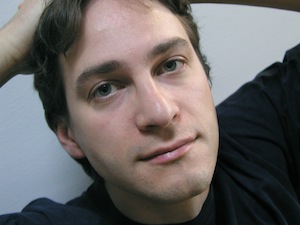 Michael Oesterle
Michael Oesterle
Territio Verbalis (2008)
Premiered: Feb. 3 2008 – Aventa Ensemble with Louis Ranger, solo trumpet
Commissioned with the support of the Canada Council for the Arts
Tell Tales (2011)
Premiered: Mar. 25, 2012 – Aventa Ensemble with soloists Miranda Wong (pno), Darnell Linwood (horn) and Corey Rae (vibraphone) Commissioned with the support of the Canada Council for the Arts
Michael Oesterle was born in Ulm, Germany in 1968. He immigrated to Canada in 1982 and has been living in Montréal since 1996. He has received several awards for his compositions including the Gaudeamus Prize, the Grand Prize at the 12th CBC Radio National Competition for Young Composers, and the Canada Council Jules Léger Prize.
Oesterle’s works have been performed by ensembles including the Quatuor Bozzini, Ensemble Contemporain du Montréal (ECM), the Berlin Radio Symphony Orchestra, Nouvel Ensemble Moderne (NEM), Ives Ensemble (Amsterdam), the Winnipeg Symphony Orchestra, Ensemble Intercontemporain (Paris), the Chicago Civic Orchestra, les Percussions de Strasbourg and the Montréal Symphony Orchestra.
He has produced projects in collaboration with composer Gerhard Staebler, violinist Clemens Merkel, painters Christine Unger and video/installation artist Wanda Koop. He composed the music for CNOTE, a film by animator Christopher Hinton, produced by the National Film Board of Canada (NFB). CNOTE was recently shown at the Montreal and Toronto International Film Festivals and received the 2005 GENIE award for best animated-short film.
In 1997 he founded the Montréal based Ensemble KORE with pianist Marc Couroux, and from 2001 and 2004 he was composer-in-residence with l’Orchestre Metropolitain du Grand Montréal.
territio verbalis is inspired by the famous mathematician and astronomer, Johannes Kepler and the peculiar injustice meted out to his elderly mother Katharina. Generation to generation, place-to-place, human nature creates sad and comical distractions for those in the midst of even the most epic achievements.
Mrs. Kepler was accused of witchcraft by a neighbour. Throughout the piece, the trumpet rises above the ensemble, voicing the accused. It is not a particularly sympathetic voice, but stubborn and strident in its own defense, often melancholic in its isolation and confusion. Other voices take on various roles: accusers—malicious, but also poignant in the description of their pain, friends and even family—initially sympathetic and supportive gradually turned off by Katharina’s prickly character and the fear of being associated with a witch, and finally “interested” neighbors all too willing tell their stories, however untruthful, first in whispers but eventually under oath.
These disparate voices are embedded in a symmetry and mathematics inspired by Kepler himself who, regardless of the frustrations of trying to help his mother in the face of almost insurmountable avarice and ignorance, continued to produce work of almost unparalleled significance in fields of math and physics.
Katharina Kepler was beset by the Middle Ages’ equivalent of ambulance chasers. What her accusers were asking for was not her death – that would only be incidental – but her estate as a settlement to make up for the insufferable mental and physical pain her witchcraft had caused to one Ursula Reinbold.
The Reinbold family conducted a whispering campaign of half-truths. Gathering camps – families and neighbors formed into groups vying for attention – who had suffered the most harm, who had seen the most unthinkable perversion – stories (often word for word quotes from a well known pamphlet on signs of witchcraft) grew continually more sensational until the body of hearsay was built into a significant body of evidence
pointing to Katharina’s alliance with the devil. The accusations were documented: 49 mostly ludicrous accusations made under corporeal oath by an assortment of neighbors, her secret malefactors. Appeals were made and refuted, settlements offered and refused, charges layered upon charges. Was she guilty? It is possible that in her practice as an amateur apothecary she was unwittingly guilty of malpractice, that she’d given some bad advise, and even harbored some ill will? That she rode a two-headed calf through the fields by moonlight is somewhat less likely, but was treated with equal or greater seriousness.
The judge would have preferred to let the case drag on. The longer it took, the more of Katharina’s assets he could acquire for himself. But he was eventually unnerved by the size and weight of Kepler’s defense. Katharina, over 70 years old, was finally subjected to territio verbalis (torture by verbal threat), in which the instruments of torture were shown to the accused. She had already endured 14 months in a damp unheated cell with next to nothing to eat while her assets were sold out from under her to pay for the costs of her own imprisonment. Being shown a rack and thumbscrews hardly registered on a mind delirious with privation.
Kepler was a man torn between heaven and earth. He measured the heavens, but was continually pulled back to earth by the strife around him. His mother’s trial is only one of the many mundane tribulations that distracted Kepler from his math and astronomy.
territio verbalis was commissioned by the Aventa Ensemble for Louis Ranger (trumpet), with financial assistance by The Canada Council for the Arts
Tell Tales (2011)
“I find that concertos are, in essence, a wonderful structure for the telling of tales. The soloist can lend a grand narrative voice to the ensemble, whose varied voices can create rich character interest and fantastic settings. Initially, I imagined “Tell Tales” to be a piano concerto with such a premise – but instead I found a narrative for the piano that, to me, resembles a somewhat reluctant guest at a dinner party. The piano engages in various conversations with others: a quick hello, a bit about the weather, have you heard about such and such, haven’t seen you in such a long time, an argument, a long embrace, a peck on the cheek, oh crap! not him again, we really need to keep in touch…”
– Michael Oesterle
